The brake caliper is an actuator of a system that provides a smooth or emergency stop of the vehicle. A little earlier we have already considered the device, various modifications of this element, as well as the replacement process.
Now let’s focus on a subtlety that is sometimes overlooked when replacing the brake pad on each wheel. This is the grease for the guide pins and the floating bracket. Let’s consider what kind of material is needed for this and why to do it.
WHY LUBRICATE THE CALIPER
Most economy cars are equipped with a combined braking system. In such vehicles, drums are installed in the rear and a disc version with calipers in the front. Basically, they are of the same type, except for small differences (mainly in the shape of the structure or its individual parts).
Most parts of the machine move when the brake system is activated, so they need to be lubricated. In addition to extraneous sounds, non-lubricated elements will simply be blocked at the most inopportune moment. If this mechanism is faulty, movement on such a machine becomes impossible. If only because this is a requirement specified in the traffic rules.
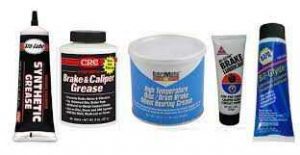 Best Brake Caliper Grease
Best Brake Caliper Grease
If you know all about the brake Caliper Grease & wanted to pick the best one, just see the table & reviews below, if you want to learn more about Brake caliper crease, read our detailed guide below.
Also Read: Best Brake Silicone Paste & Grease
Best Brake Caliper Grease | Comparison Table 2025
| Preview | Product | Features | Price $$ |
 | CRC Brake Caliper Grease |
| view on Amazon |
 | Permatex Brake Caliper Grease |
| view on Amazon |
 | Super Lube Silicone Grease |
| view on Amazon |
 | SIL-Glyde Silicone Brake Grease |
| view on Amazon |
 | Mission Automotive Dielectric Grease |
| view on Amazon |
 | CRC Synthetic Grease |
| view on Amazon |
 | Napa Lubricating Compound |
| view on Amazon |
 | Loctite Disc Brake Quiet Stick |
| view on Amazon |
 | Ford Genuine Brake Caliper |
| view on Amazon |
Best Brake Caliper Grease | 2025 Products Overview
1. CRC 05359 Brake Caliper Synthetic Grease – 8 Wt Oz
Product Overview:
The CRC 05359 Brake Caliper Synthetic Grease is a specialized lubricant formulated for automotive brake systems. This 8 oz bottle of synthetic grease offers excellent protection and performance for critical brake components.
[amazon fields=”B000M8PZGE” value=”thumb” image_size=”large”]
[amazon fields=”B000M8PZGE” value=”button”]
Performance: Designed to prevent caliper binding, vibration, and corrosion, this grease ensures smooth operation of brake calipers. It performs exceptionally well in a wide temperature range from -40°F to 400°F, making it suitable for various climates and driving conditions.
Durability: The inclusion of molybdenum, PTFE, and graphite enhances the grease’s ability to resist moisture and washout. These components provide superior lubrication and protection against wear, extending the life of brake components. Its high flash point and dropping point indicate excellent stability under high temperatures, ensuring consistent performance.
Compatibility: CRC 05359 is safe for use on plastic and rubber, making it versatile for different brake system materials. It is particularly effective on metal-to-metal contact points and sliding surfaces, ensuring optimal functionality and reducing wear and tear.
Strength: The grease has a high Timken OK Load, indicating its strong load-carrying capacity and ability to handle heavy-duty applications. This makes it ideal for high-stress areas within the brake system, providing reliable protection and performance.
- Prevents caliper binding, vibration, and corrosion
- Wide operating temperature range (-40°F to 400°F)
- Contains molybdenum, PTFE, and graphite for enhanced durability
- Resists moisture and washout
- Safe for plastic and rubber components
- High flash point and dropping point for stability
- High Timken OK Load for excellent load-carrying capacity
- Specific use limited to automotive brake systems
- Requires proper application for optimal performance
2. Permatex 85188-6PK Ultra Disc Brake Caliper Lube, 0.5 oz.
Product Overview:
Permatex Ultra Disc Brake Caliper Lube is a specialized synthetic lubricant designed to withstand the harsh conditions typically found in brake systems. This 0.5 oz tube provides a non-melting, high-performance solution for maintaining critical brake components.
[amazon fields="B004WJPN2A" value="thumb" image_size="large"]
[amazon fields="B004WJPN2A" value="button"]
Performance: The green, non-melting formula ensures that caliper pins, sleeves, bushings, and pistons remain well-lubricated throughout the lifespan of brake pads. This helps prevent common issues such as caliper sticking and uneven brake wear, promoting smoother and more efficient braking.
Durability: Designed for adverse brake conditions, Permatex Ultra Disc Brake Caliper Lube can handle high temperatures and heavy loads without breaking down. Its synthetic composition ensures long-lasting lubrication, reducing the frequency of maintenance and ensuring consistent performance.
Versatility: This lube is suitable for a variety of applications within the brake system, including caliper pins, sleeves, bushings, and pistons. Its versatility makes it a valuable tool for both professional mechanics and DIY enthusiasts, providing reliable protection and lubrication for key brake components.
Reliability: Permatex is known for its problem-solving solutions in equipment maintenance, and this product is no exception. The Ultra Disc Brake Caliper Lube is formulated to provide reliable performance in demanding conditions, ensuring your brake system operates smoothly and efficiently.
- Non-melting, synthetic formula for high-temperature performance
- Ensures lubrication of critical brake components throughout the lifespan of brake pads
- Suitable for various applications including caliper pins, sleeves, bushings, and pistons
- Reliable and durable, reducing the need for frequent maintenance
- Trusted brand known for quality maintenance solutions
- Small 0.5 oz tube may require multiple purchases for extensive use
- Specific to brake system applications, not a multi-purpose lubricant
3. Super Lube 92016 Silicone Grease
Product Overview:
Super Lube 92016 Silicone Grease is a versatile and robust lubricant designed for various applications, offering exceptional protection and performance across multiple materials and environments. This NLGI grade 2 heavy-duty multipurpose lubricant is patented and boasts several advantageous properties.
[amazon fields="B0081JE1PM" value="thumb" image_size="large"]
[amazon fields="B0081JE1PM" value="button"]
Performance: Super Lube 92016 provides excellent resistance to wear, corrosion, dirt, dust, and water, including saltwater. This makes it suitable for both indoor and outdoor applications, ensuring durability and longevity in diverse environments. Its heavy-duty formulation ensures that it remains effective under high-stress conditions.
Versatility: This grease is suitable for a wide range of materials, including wood, rubber, leather, plastic, and fabric. Its multipurpose nature makes it a valuable tool for various maintenance tasks, from household repairs to industrial applications.
Safety: The product is dielectric, meaning it can be safely used in electrical applications without conducting electricity. It is also food-grade with an NSF Rating H-1, indicating that it is safe for incidental food contact. This makes it suitable for use in food processing equipment and other environments where food safety is a concern.
Stability: Super Lube 92016 is designed to not drip, run, or evaporate, ensuring that it stays in place and continues to provide lubrication and protection over time. Its resistance to saltwater makes it especially useful in marine environments or areas exposed to harsh conditions.
- Heavy-duty, multipurpose lubricant suitable for various materials
- Resistant to wear, corrosion, dirt, dust, saltwater, and regular water
- Dielectric and food-grade with an NSF Rating H-1, safe for incidental food contact
- Stable and non-dripping, non-running, and non-evaporating
- Patented formulation providing reliable performance
- As a multipurpose lubricant, it may not be specialized enough for certain high-performance applications
- The broad range of uses might require careful application to ensure optimal results for specific tasks
Also Read: Best Car Leather Cleaner And Conditioner
4. AGS New SIL-Glyde 12
Product Overview:
Sil-Glyde Brake Lubricant by AGS is a high-performance, silicone-based lubricant specifically formulated for automotive brake systems. This 12-ounce tub offers ample product for comprehensive brake maintenance, ensuring smooth and quiet operation of the entire brake assembly.
[amazon fields="B07VC55LF5" value="thumb" image_size="large"]
[amazon fields="B07VC55LF5" value="button"]
Performance: Sil-Glyde Brake Lubricant excels in eliminating disc brake squeal, providing a quiet and comfortable driving experience. Its silicone-based formula effectively dampens vibrations between contact points within the brake assembly, ensuring smooth and consistent brake performance. With heat resistance up to 425°F (218°C), it maintains its lubricating properties even under extreme braking conditions.
Protection: This lubricant offers excellent protection against corrosion and rust, crucial for maintaining the longevity and reliability of brake components. By preventing rust and corrosion, Sil-Glyde helps extend the life of brake parts, reducing the need for frequent replacements and maintenance.
Compatibility: Sil-Glyde is compatible with plastic and rubber parts, making it suitable for use on various components within the brake system. Its versatility ensures that it can be applied to different materials without causing damage or degradation, enhancing the overall efficiency of the brake system.
Application: Packaged in a convenient 12-ounce tub, Sil-Glyde is easy to apply and provides enough lubricant for multiple applications. It is recommended for use on the entire brake assembly, including caliper pins, bushings, sleeves, and other contact points, ensuring comprehensive lubrication and protection.
- Eliminates disc brake squeal for a quieter ride
- Provides excellent protection against corrosion and rust
- Dampens vibrations between contact points in the brake assembly
- Heat resistant up to 425°F (218°C)
- Compatible with plastic and rubber parts
- Convenient 12-ounce tub for easy application
- Specific to brake systems, not suitable for other lubrication needs
- May require careful application to avoid excess lubricant on non-brake components
5. Mission Automotive Dielectric Grease
Product Overview:
Mission Automotive Dielectric Grease is a versatile and high-quality synthetic silicone grease designed to seal, protect, and lubricate a wide range of automotive, electrical, and marine components. This product offers robust performance and protection, making it an essential tool for both professional mechanics and DIY enthusiasts.
[amazon fields="B07VC55LF5" value="thumb" image_size="large"]
[amazon fields="B07VC55LF5" value="button"]
Performance: This dielectric grease excels in sealing out contaminants such as salt, dirt, and moisture, preventing oxidation and inhibiting corrosion. Its waterproof formulation ensures long-lasting protection in harsh environments, making it suitable for both automotive and marine applications.
Versatility: The grease is compatible with metal, rubber, and plastic materials, making it highly versatile. It can be used for various tasks, including changing spark plugs, lubricating brake caliper pins, preserving rubber gaskets, O-rings, hoses, and more. This wide range of applications makes it a valuable addition to any maintenance toolkit.
Ease of Use: The product comes with an applicator brush, allowing for easy and precise application. This ensures that the grease is applied exactly where needed, reducing waste and enhancing efficiency. The brush also helps in reaching tight or hard-to-access areas, making the application process more convenient.
Quality: Produced to the highest industry standards, Mission Automotive Dielectric Grease guarantees reliable performance and durability. Its synthetic silicone formulation provides excellent thermal stability and remains effective across a broad temperature range, ensuring consistent protection and lubrication under various conditions.
- Seals, protects, and lubricates a variety of components
- Waterproof synthetic silicone formulation prevents oxidation and inhibits corrosion
- Compatible with metal, rubber, and plastic materials
- Suitable for automotive, electrical, and marine applications
- Includes an applicator brush for easy and precise application
- Produced to the highest industry standards for reliable performance
- Specific use as dielectric grease may limit its application to other lubrication needs
- The included brush might require careful cleaning to prevent cross-contamination between different uses
6. Sta-Lube SL3303 Brake Caliper
Product Overview:
Sta-Lube SL3303 is a high-performance synthetic grease specifically formulated for use in disc and drum brake systems. This product stands out for its advanced formulation and versatile application, making it a reliable choice for maintaining brake components.
[amazon fields="B07VC55LF5" value="thumb" image_size="large"]
[amazon fields="B07VC55LF5" value="button"]
Performance: Sta-Lube SL3303 contains Molybdenum Disulfide, extreme pressure agents, anti-seize polymers, and PTFE. These components work together to provide superior lubrication, reducing caliper binding, vibration, and corrosion. The inclusion of these high-performance additives ensures smooth and efficient brake operation.
Temperature Resistance: This grease is designed to withstand an extreme temperature range from -30°F to 600°F. This makes it suitable for various brake applications, ensuring consistent performance even under extreme conditions. Its high-temperature resistance is particularly beneficial for maintaining braking efficiency during intense driving conditions.
Protection: Sta-Lube SL3303 offers excellent protection against moisture, which helps prevent rust and corrosion. Its non-flammable formulation enhances safety, making it a reliable choice for high-temperature brake systems. This grease is also safe for use with plastic and rubber components, ensuring compatibility with various materials within the brake system.
Application: The grease is ideal for metal-to-metal contact points and sliding surfaces within the brake assembly. Its ability to resist moisture and its non-flammable nature make it suitable for use in both disc and drum brake systems. The advanced formulation ensures that it stays in place, providing long-lasting lubrication and protection.
- Contains Molybdenum Disulfide, extreme pressure agents, anti-seize polymers, and PTFE for superior lubrication
- Prevents caliper binding, vibration, and corrosion
- Suitable for an extreme temperature range of -30°F to 600°F
- Resists moisture and has a non-flammable formulation
- Safe for plastic and rubber components
- Ideal for metal-to-metal contact points and sliding surfaces
- Specific to brake systems, limiting its use for other lubrication needs
- Requires careful application to avoid excess grease on non-essential areas
Also Read: Best Car Floor Mats
7. Napa 7651346 SIL Glyde Silicone
Product Overview:
The Napa Sil-Glyde SG-8 Lubricating Compound is a versatile and high-quality silicone-based lubricant designed for a wide range of automotive applications. Known for its excellent performance and durability, this 8-ounce tube of lubricant is a private branding of the American Grease Stick Company (AGS) Sil-Glyde SG-8.
[amazon fields="B07VC55LF5" value="thumb" image_size="large"]
[amazon fields="B07VC55LF5" value="button"]
Performance: Sil-Glyde SG-8 provides excellent lubrication and protection for various automotive components. Its high film strength ensures that it stays put even under demanding conditions, reducing friction and wear. The lubricant is water-repellent, making it suitable for applications exposed to moisture and harsh environments.
Versatility: This lubricant is suitable for multiple automotive applications, including brake pads, calipers, rubber boots, fan belts, v-belts, weather stripping, trunk seals, and bumpers. Its compatibility with different materials such as rubber and metal makes it a valuable addition to any maintenance toolkit, providing reliable performance across various tasks.
Temperature Resistance: Sil-Glyde SG-8 offers a wide chemical working temperature range from -20 to 500 degrees Fahrenheit. This broad range ensures consistent performance in extreme temperatures, making it suitable for both cold and hot environments. Whether dealing with icy conditions or high-heat scenarios, this lubricant maintains its effectiveness.
Application: The product comes in a convenient 8-ounce tube, allowing for easy and precise application. The tube design ensures that the lubricant can be applied accurately to the required areas without waste, enhancing efficiency during maintenance tasks.
Protection: Sil-Glyde SG-8 protects against rust, corrosion, and oxidation, ensuring the longevity and reliability of the components it lubricates. Its water-repellent properties further enhance its protective capabilities, making it suitable for use in areas exposed to water and other contaminants.
- High film strength ensures effective lubrication and protection
- Water-repellent properties make it suitable for moisture-exposed applications
- Wide chemical working temperature range (-20 to 500°F) for versatility in different environments
- Compatible with rubber, metal, and various other materials
- Convenient 8-ounce tube for easy and precise application
- Protects against rust, corrosion, and oxidation
- Specific to automotive applications, limiting its use for other purposes
- Requires proper application to ensure optimal performance
8. Loctite 40300 Disc Brake Quiet Stick
Product Overview:
The Loctite 40300 Disc Brake Quiet Stick is a unique and innovative product designed to reduce brake pad vibrations and eliminate the squeaking and noise often associated with braking. This wax-like stick provides a convenient and effective solution for maintaining quiet and efficient braking systems.
[amazon fields="B07VC55LF5" value="thumb" image_size="large"]
[amazon fields="B07VC55LF5" value="button"]
Performance: The Disc Brake Quiet Stick forms a water-resistant, high-temperature film that effectively absorbs vibrations. This helps to quiet disc braking and reduce the noise that can occur during operation. Its advanced formula ensures that the film remains intact under high temperatures, providing consistent performance even during intense braking conditions.
Application: The product comes in a wax-like stick form, making it easy to apply directly to the disc brake pads at the point of contact with the caliper. This targeted application ensures that the product is used efficiently and effectively, reducing waste and mess. The revolutionary applicator design further enhances the ease of use, avoiding the sticky mess commonly associated with traditional solvent and water-based products.
Protection: In addition to reducing noise, the Loctite 40300 Disc Brake Quiet Stick also helps prevent the loosening of metal fasteners caused by vibrations. This added benefit ensures that brake components remain securely in place, enhancing the overall safety and reliability of the braking system.
Durability: The water-resistant and high-temperature resistant properties of the film ensure long-lasting protection and performance. This durability makes the product suitable for various driving conditions, from everyday use to more demanding environments.
- Reduces brake pad vibrations and eliminates squeaking and noise
- Forms a water-resistant, high-temperature film that absorbs vibrations
- Easy and clean application with a revolutionary applicator
- Prevents loosening of metal fasteners caused by vibrations
- Durable and long-lasting performance under high-temperature conditions
- Specific to disc brake systems, limiting its use for other applications
- Requires precise application to ensure optimal performance
9. Genuine Ford Fluid XG-3-A
Product Overview:
Genuine Ford Fluid XG-3-A is a high-quality lubricant designed specifically for automotive applications. Known for its versatility and durability, this product is well-suited for lubricating disc brake caliper slide pins and providing critical protection for ignition system components.
[amazon fields="B07VC55LF5" value="thumb" image_size="large"]
[amazon fields="B07VC55LF5" value="button"]
Performance: The XG-3-A lubricant excels in high-temperature environments, making it ideal for use on disc brake caliper slide pins where heat resistance is crucial. Its formulation provides excellent resistance to water, ensuring that it remains effective even in moist conditions. This durability helps maintain smooth and reliable brake performance, reducing friction and wear on caliper slide pins.
Versatility: In addition to its use in brake systems, Genuine Ford Fluid XG-3-A is compatible with EPDM rubber, enhancing its versatility for various automotive applications. This makes it suitable for use on different types of rubber components within the vehicle.
Ignition System Applications: The product also offers high-voltage sealing capabilities, which are beneficial for ignition system applications. By coating the inner distributor cap surface, it helps suppress voltage leaks and maintain effective ignition performance. This feature adds to the lubricant’s versatility, making it a valuable tool for both brake and ignition system maintenance.
Application: Genuine Ford Fluid XG-3-A is designed for precise and effective application. Its specialized formulation ensures that it adheres well to the necessary components, providing reliable lubrication and protection where needed.
Protection: The lubricant's resistance to water and heat provides excellent protection against corrosion and wear. Its high-voltage sealing properties further enhance its functionality, ensuring that it contributes to the longevity and efficiency of the vehicle's ignition system.
- Excellent resistance to heat and water, ensuring durability and reliability
- Compatible with EPDM rubber for versatile use
- Provides high-voltage sealing to suppress ignition system voltage leaks
- Effective for lubricating disc brake caliper slide pins
- Helps maintain smooth brake performance and prevents friction wear
- Primarily designed for automotive use, limiting its application to other areas
- Requires precise application to ensure optimal performance in both brake and ignition systems
Also Read: Best Windshield Wiper Fluid
Detailed Guide on Best Brake Caliper Grease 2025
 WHAT IS HAPPENING IN THE CALIPERS DURING OPERATION
WHAT IS HAPPENING IN THE CALIPERS DURING OPERATION
Among the elements that carry the highest loads are the brake calipers. When the driver applies the brake, the temperature of the pad and disc can rise up to 600 degrees. Obviously, this depends on the speed of the vehicle.
The device of this mechanism is mainly in that it cools quickly even with strong heating. However, when activating the system, the finger is always exposed to strong heat.
In addition to this element, in some cases, the floating bracket can also overheat. True, this happens more often when descending winding mountain roads. But if the driver often accelerates and brakes sharply, he can expose the caliper to such overheating.
No matter how high-quality the cooling of the mechanism was, no manufacturer was able to develop such a system that would protect the part from moisture and small abrasive particles in the dirt. To maintain the efficiency of the device in such situations, an important condition is the lubrication of the moving elements.
Also Read: Best Foam Cannon Soap
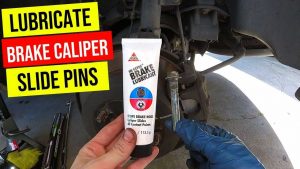 HOW TO LUBRICATE THE BRAKE CALIPERS
HOW TO LUBRICATE THE BRAKE CALIPERS
It should be noted that not all lubricants are suitable for this procedure. For example, if after changing the engine oil some of the fluid remains, in this case, it cannot be used.
For this, the manufacturers have developed a special pasta. In auto parts and supply stores, you can find both inexpensive and more expensive caliper lubricants. Here is a small list of the most common ones:
- One of the cheaper options is the MC1600. The pasta is sold in tubes of 5-100 grams. Convenient if you do not need to buy material with a margin;
- For vehicles operating in difficult conditions, there is a more effective lubricant than Liqui Moli. The material withstands high temperatures and high humidity well;
- If the car often moves on winding roads, TRW is a good option for such transportation;
- There is Permatex material for the braking system installed on off-road vehicles;
- The most expensive, but at the same time, is distinguished by its reliable lubricant - from the automobile manufacturer VAG;
- If the brakes make a specific noise during operation, regardless of what they are lubricated, an excellent option for such cases is Bosch paste.
What to rely on when choosing a lubricant? You should not start with the cost of the material, because each of the pastes is designed for its own type of transport and will show efficiency in the very conditions for which it was created. But you definitely shouldn't buy the cheapest one.
Also Read: Best Dog Car Seat Covers
How to Inspect and Lube Your Brakes | Video Explanation
HOW TO LUBRICATE THE CALIPERS
There is nothing complicated about the lubrication procedure. If the driver is able to disassemble the caliper and then mount it correctly, he will take care of the lubrication. Here is a quick guide on how to do the procedure:
- We disassemble the caliper (for how to remove it and then put it back in place,
- We remove dirt and rust;
- If rust is present (and it will be in the vast majority of cars), the removal of the plaque must be done using a mechanical treatment and not some means;
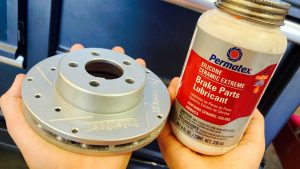
- Degrease the treated surface;
- Lubricate the caliper pins, rear pads, and bracket plates;
- Usually, if a lot of greases is applied, its excess will be eliminated during the installation of the part;
- It is even easier to lubricate the piston: for this, a paste is not used, but a liquid is used. It is applied using a conventional syringe;
- We reassemble the mechanism and install it on the steering knuckle.
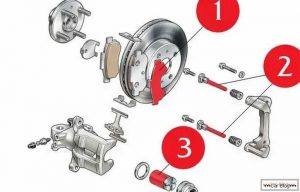 REQUIREMENTS FOR THE LUBRICATION OF THE CALIPERS
REQUIREMENTS FOR THE LUBRICATION OF THE CALIPERS
So, not all lubricants will work with the pliers. These are the requirements for the material:
- It must withstand at least heating up to two hundred degrees;
- If the temperature on the mechanism reaches about five hundred degrees Celsius, the material should not melt and come out of the gripper. Otherwise, the parts will be "treated" with dirt instead of paste;
- It must not be washed with water and be resistant to the effects of car chemicals, which can be used when washing or processing wheels, as well as in the brake system itself (TZ);
- It is impossible for the material to react with rubber and plastic elements, destroying their structure.
Considering all these factors, it becomes clear why a special paste or liquid has been developed to lubricate these elements. For these reasons, it is not possible to use lithium or graphite grease: they will come out immediately after the first pressure of the brake pedal when the car is stationary.
Also Read: Best 5w30 Synthetic Oil
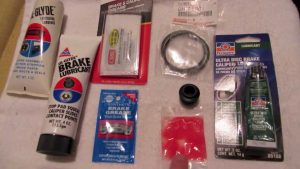 TYPES OF BRAKE CALIPER LUBRICANTS
TYPES OF BRAKE CALIPER LUBRICANTS
There are two types of caliper lubricants. The first category is universal. They are used to process various parts. The second type has a narrow focus. They belong to the category of professional lubricants and are applied to each part separately.
In the arsenal of some companies you can find the following types of lubricants:
- For the brake cylinder (placed under the boot);
- Anti-squeak paste, whose purpose is to eliminate the noise for the parts that have the function of guiding the bracket during its movement;
- The material that is applied to the anti-squeak plate and the non-working part of the brake pad.
These lubricants are used by the world's leading car manufacturers. In addition to these pastes, the companies also sell rust cleaning solutions and brake fluids.
A good option for an inexpensive analog is American-made paste, Slipkote 220-RDBC, as well as domestic MC1600 products. Both materials have good properties in contact with water and many chemicals, and the price is affordable for most motorists.
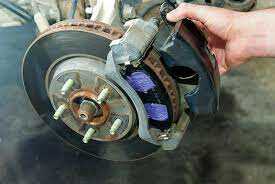 WHAT IS THE BEST CALIPER LUBRICANT?
WHAT IS THE BEST CALIPER LUBRICANT?
First of all, you should pay attention to the lubricants that the manufacturer recommends using. If unsuitable material is used, it can sinter during braking and block the device.
The most important condition is thermal stability. In this case, the lubricant will not lose its properties even in active mode. If you use materials that do not withstand high temperatures, they quickly lose their properties due to drying.
Often, the pad material is not designed to lubricate anti-squeak parts or fingers. This will definitely be indicated on the pasta packaging.
Also Read: Best Car Cover For Extreme Sun
WHEN THE LUBRICANT IS INEFFECTIVE AND NEEDS TO BE REPLACED
It often happens that motorists are trying to repair the breakage of some elements of the caliper by lubricating them. It is worth considering that lubrication provides only smooth movement of the elements, but does not eliminate their development.
For this reason, if the parts began to beat due to severe wear, it would be correct not to apply a thick layer of paste, but to replace the mechanism. Some parts are repaired using a repair kit.
And in conclusion, we propose to see what the procedure looks like on the example of a specific car:
FAQs
What Grease Is Best For Brake Calipers?
The best grease for brake calipers is a high-temperature synthetic grease that is specifically designed for use in automotive braking systems. This type of grease is designed to withstand the high temperatures and pressures that are generated during braking and can help to prevent corrosion, reduce friction, and extend the life of your brake calipers.
There are several different brands of high-temperature synthetic brake caliper grease available on the market, including:
Permatex Ultra Disc Brake Caliper Lube
CRC Disc Brake Quiet
Sil-Glyde Brake Lubricant
Akebono Performance Ultra-Premium Ceramic Brake Lubricant
When selecting a brake caliper grease, it's important to choose a product that is compatible with your vehicle's braking system and that meets the manufacturer's specifications. It's also important to follow the manufacturer's instructions for application and use, as applying too much or too little grease can impact the performance of your brakes. If you're unsure which type of grease to use or how to apply it, consult with a certified mechanic or brake specialist.
Do You Need Special Grease For Brake Calipers?
Yes, you should use a special type of grease that is specifically formulated for use in brake calipers. This is because brake calipers operate in a high-temperature and high-pressure environment, and standard greases may not be able to withstand these conditions.
The grease used in brake calipers is typically a high-temperature synthetic grease that is designed to withstand the extreme heat and pressure that is generated during braking. It is also designed to resist water and corrosion and to provide lubrication and protection for the various components of the braking system.
Using the wrong type of grease in your brake calipers can lead to a number of problems, including reduced braking performance, increased wear and tear on the components, and even brake failure in extreme cases. It is therefore important to use a grease that is specifically formulated for use in brake calipers and to follow the manufacturer's instructions for application and use. If you're unsure which type of grease to use or how to apply it, consult with a certified mechanic or brake specialist.
Can I Use Lithium Grease On Brake Calipers?
It is not recommended to use lithium grease on brake calipers, as it is not designed to withstand the high temperatures and pressures that are generated during braking. Lithium grease is a general-purpose grease that is commonly used for lubricating household items and other low-temperature applications.
Brake calipers, on the other hand, operate in a high-temperature and high-pressure environment, and require a special type of grease that is specifically formulated for use in automotive braking systems. This type of grease is typically a high-temperature synthetic grease that is designed to withstand the extreme heat and pressure that is generated during braking and to provide lubrication and protection for the various components of the braking system.
Using the wrong type of grease on your brake calipers can lead to a number of problems, including reduced braking performance, increased wear and tear on the components, and even brake failure in extreme cases. It is therefore important to use a grease that is specifically formulated for use in brake calipers and to follow the manufacturer's instructions for application and use. If you're unsure which type of grease to use or how to apply it, consult with a certified mechanic or brake specialist.
Can I Use Synthetic Grease In Brake Calipers?
Yes, synthetic grease can be used in brake calipers, and in fact, it is often the recommended type of grease for use in automotive braking systems. Synthetic grease is designed to withstand high temperatures and pressures and to provide long-lasting lubrication and protection for the various components of the braking system.
When selecting a synthetic grease for use in your brake calipers, it is important to choose a product that is specifically formulated for use in automotive braking systems, and that meets the manufacturer's specifications for your particular vehicle. It is also important to follow the manufacturer's instructions for application and use, as applying too much or too little grease can impact the performance of your brakes.
Overall, using a high-quality synthetic grease that is specifically formulated for use in brake calipers can help to ensure the proper functioning of your braking system, extend the life of your brake components, and help to prevent corrosion and other forms of damage. If you're unsure which type of grease to use or how to apply it, consult with a certified mechanic or brake specialist.
What Type Of Brake Grease Is Best?
The best type of brake grease is a high-temperature synthetic grease that is specifically designed for use in automotive braking systems. This type of grease is formulated to withstand the high temperatures and pressures that are generated during braking and to provide long-lasting lubrication and protection for the various components of the braking system.
When selecting a brake grease, it's important to choose a product that is compatible with your vehicle's braking system and that meets the manufacturer's specifications. It's also important to follow the manufacturer's instructions for application and use, as applying too much or too little grease can impact the performance of your brakes.
Some of the best brake grease brands on the market include:
- Permatex Ultra Disc Brake Caliper Lube
- CRC Disc Brake Quiet
- Sil-Glyde Brake Lubricant
- Akebono Performance Ultra-Premium Ceramic Brake Lubricant
It's worth noting that different types of brake grease may be better suited for different types of brakes and driving conditions. If you're not sure which type of brake grease is best for your vehicle, consult with a certified mechanic or brake specialist for guidance.
What Kind Of Grease Is Caliper Grease?
Caliper grease is a type of high-temperature synthetic grease that is specifically formulated for use in brake calipers. It is designed to withstand the extreme heat and pressure that is generated during braking and to provide long-lasting lubrication and protection for the various components of the braking system.
Caliper grease is typically made from a combination of synthetic base oils, thickeners, and additives that are specifically chosen for their ability to withstand high temperatures, resist water and corrosion and provide long-lasting lubrication.
Some of the key characteristics of caliper grease include:
- High-temperature stability: Caliper grease is able to maintain its lubricating properties at high temperatures, which is critical for ensuring the proper functioning of the braking system.
- Water resistance: Caliper grease is designed to resist water and moisture, which can cause corrosion and other forms of damage to the brake components.
- Anti-wear properties: Caliper grease contains additives that help to reduce friction and wear on the various components of the braking system, which can extend their lifespan and improve braking performance.
Overall, caliper grease is an important component of the braking system, and using the right type of grease can help to ensure the proper functioning of your brakes and extend the lifespan of your brake components. It's important to follow the manufacturer's instructions for application and use and to choose a product that is specifically formulated for use in brake calipers.
Can I Use Moly Grease On Brakes?
It is generally not recommended to use moly grease on brakes. Moly grease, also known as molybdenum disulfide grease, contains a high concentration of solid lubricants, which can interfere with the proper functioning of the brake components.
Moly grease is often used in applications where high-pressure and high-temperature resistance is required, such as in heavy machinery or industrial equipment. However, for automotive brakes, a high-temperature synthetic grease that is specifically designed for use in braking systems is the recommended choice.
Using moly grease on brake components can cause several issues, such as reduced brake performance, increased brake noise, and premature wear of brake components. Moly grease can also contaminate the brake pads and rotors, which can cause brake fade and reduce stopping power.
In summary, it is not recommended to use moly grease on brakes. It's important to use a high-temperature synthetic grease that is specifically formulated for use in braking systems and to follow the manufacturer's instructions for application and use. If you're not sure which type of grease to use or how to apply it, consult with a certified mechanic or brake specialist.
Is Silicone Grease Good For Brakes?
Silicone grease can be a suitable option for some brake components, but it is not recommended for use on all brake parts. Silicone grease is often used to lubricate rubber parts and seals, as it can help to prevent them from drying out, cracking, or deteriorating over time.
When it comes to brakes, silicone grease can be used to lubricate brake caliper slide pins, as well as the rubber bushings and seals in the braking system. However, it is not recommended to use silicone grease on brake pads, rotors, or other metal-to-metal contact surfaces in the braking system.
Using silicone grease on metal-to-metal contact surfaces can cause issues such as brake noise, reduced stopping power, and premature wear of brake components. Silicone grease is also not suitable for use in high-temperature applications, which is why it should not be used on brake pads or rotors.
In summary, silicone grease can be a suitable option for lubricating certain brake components, but it is not recommended for use on all brake parts. It's important to follow the manufacturer's instructions for application and use and to choose a product that is specifically formulated for use in the braking system. If you're not sure which type of grease to use or how to apply it, consult with a certified mechanic or brake specialist.
How Often Should You Grease Calipers?
The frequency at which you should grease calipers depends on several factors, including the type of grease used, the driving conditions, and the manufacturer's recommendations. However, as a general guideline, it is recommended to grease the calipers every time you change the brake pads or perform other brake maintenance tasks.
During routine brake maintenance, the calipers are typically inspected for signs of wear and damage, and the slide pins and other components are cleaned and lubricated as needed. This helps to ensure that the calipers are functioning properly and that the brake pads are wearing evenly.
In addition to routine maintenance, you may also need to grease the calipers if you notice any signs of binding, uneven brake wear, or other issues that could be related to a lack of lubrication. It's important to follow the manufacturer's instructions for application and use, and to choose a high-temperature synthetic grease that is specifically formulated for use in the braking system.
Overall, the frequency at which you should grease the calipers will depend on a variety of factors, and it's important to consult with a certified mechanic or brake specialist for specific recommendations based on your vehicle and driving conditions.
Is Lithium Better Than Grease?
Lithium is not an alternative to grease, but rather a component that is commonly found in many types of grease formulations. Lithium is a type of thickening agent that is used to give grease its semi-solid consistency and to help it adhere to surfaces.
There are many different types of grease formulations that use lithium as a thickening agent, including general-purpose grease, high-temperature grease, and synthetic grease. These different types of grease are formulated to provide specific properties and characteristics that make them suitable for various applications.
In general, grease is a better choice than lubricating oil for applications where a semi-solid consistency is required, such as in bearings, gears, and other moving parts. Grease provides better adhesion and stays in place better than lubricating oil, which can help to reduce friction and wear.
Overall, lithium is an important component of many types of grease formulations, but it is not a substitute for grease itself. The specific type of grease that is best for a particular application will depend on factors such as operating conditions, temperature range, and load requirements. It's important to choose the right type of grease for the job and to follow the manufacturer's instructions for application and use.
Does Lithium Grease Damage Rubber?
Lithium grease is generally considered safe for use on rubber components, as long as it is formulated to be compatible with rubber. Lithium is a common thickening agent used in many types of grease formulations, including those that are designed for use on rubber.
However, it's important to note that not all types of lithium grease are suitable for use on rubber. Some formulations may contain additives or other components that could damage rubber or cause it to degrade over time. For this reason, it's important to choose a high-quality lithium grease that is specifically formulated to be compatible with rubber.
When using lithium grease on rubber components, it's also important to follow the manufacturer's instructions for application and use. In general, a thin layer of grease should be applied to the surface of the rubber, being careful not to apply too much or get the grease on any other components. This can help to prevent the rubber from drying out or cracking over time and can help to ensure that the components continue to function properly.
Overall, lithium grease can be a suitable option for use on rubber components, but it's important to choose a high-quality formulation that is designed to be compatible with rubber and to follow the manufacturer's instructions for application and use.
What Is The Difference Between Grease And Lithium Grease?
Grease and lithium grease are both types of lubricants, but the key difference between them is the type of thickening agent that is used.
Grease is a semi-solid lubricant that is made up of a base oil, a thickening agent, and other additives. The thickening agent in grease can be made from a variety of materials, including lithium, calcium, aluminum, and other metals. The choice of thickening agent depends on the specific properties that are required for the intended application.
Lithium grease, on the other hand, is a specific type of grease that is formulated using lithium as the thickening agent. Lithium is a versatile and commonly used thickening agent that is compatible with a wide range of base oils and additives. Lithium grease is widely used for lubricating automotive and industrial equipment due to its high resistance to water, heat, and mechanical stress.
In general, the choice between grease and lithium grease will depend on the specific requirements of the application. For example, lithium grease may be preferred in applications where high-temperature resistance and water resistance are important, while other types of grease may be better suited for applications with different requirements.
Overall, both grease and lithium grease are effective lubricants that can help to reduce friction and wear in a wide range of applications. The choice between them will depend on the specific requirements of the application, as well as the preferences and experience of the user.
Conclusion:
Well, This was all about Best Brake Caliper Grease, If you want to send us feedback on this guide feel free to contact me in the comment below.

Hi, I am David Bailey a dedicated writer from Linden Bridge School with a degree in mechanical engineering and a degree in marketing. I strive to simplify complex subjects and like to explain complex and technical matters in an easy-to-understand manner. Read More Here
